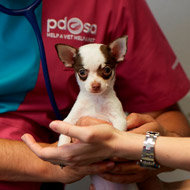Millions of pets bought on impulse, report finds

PDSA has launched #PawsFirst to highlight the problems caused by by people getting pets impulsively.
Millions of pets are being bought with little or no research into their welfare needs, according to a new report.
Findings from the PDSA’s fifth Animal Wellbeing Report (PAW) reveal that impulse buys are fuelling the pet welfare crisis, with over 4.5 million owners doing no research at all before getting a pet.
The PDSA say that this lack of knowledge can lead to stressed, lonely, obese and aggressive pets.
The report, launched today at Central Hall, Westminster, is the largest, most comprehensive insight into the state of the nation’s pets. Produced in conjunction with YouGov, it is the biggest ever annual survey of pet owners and veterinary professionals.
Commenting on the findings, Nicola Martin, PDSA’s head of pet health and welfare, said: “PDSA research shows that as a nation we’re still in love with the idea of pet ownership…but impulse acquisitions and busy lifestyles mean some people are totally unprepared for the realities, and the effort, that owning a happy, healthy pet entails.
“Sadly, too many people are continuing to underestimate the financial cost and the importance of choosing the right pet for their lifestyle before taking on a new pet. Ultimately this is contributing to the suffering of millions of pets.”
The findings also show that since the launch of the report in 2011, millions of dogs are still being left alone for long periods of time. Figures reveal that 2.3 million dogs (25 per cent of the UK’s dog population) are routinely left alone for five hours or more.
Another shocking finding is that nearly a quarter of all pet owners would still consider buying a dog from a puppy farm – an intensive establishment which produces puppies purely for profit without consideration for the health or welfare of the pups or breeding bitches.
To help combat these serious welfare issues, PDSA is launching #PawsFirst to highlight the problem with rushing into getting a pet without research.
The campaign includes a ‘Get Petwise’ quiz which provides practical information to help people understand if pets are suitable for them and their lifestyle. It also encourages people to speak to their local veterinary practice for more advice.
The PDSA say that by working with pet owners, the veterinary profession, animal welfare organisations and the Government, positive change can be achieved and these serious issues can be tackled.
BVA president Sean Wensley said: “For the past five years, the PDSA Animal Wellbeing Report has highlighted where pets’ needs are not being met, what progress has been made, and on what scale. Issues such as social isolation in dogs and rabbits, and obesity in all species, must be understood if we are to claim that we are treating our companion animals fairly.
“Improving animal welfare is a top priority for BVA and we support our members to help address issues such as those revealed by the PAW report.”



 The Veterinary Medicines Directorate (VMD) is inviting applications from veterinary students to attend a one-week extramural studies (EMS) placement in July 2026.
The Veterinary Medicines Directorate (VMD) is inviting applications from veterinary students to attend a one-week extramural studies (EMS) placement in July 2026.